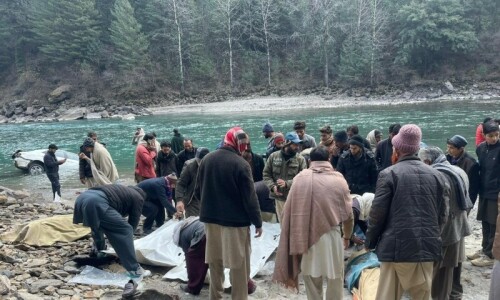ISLAMABAD, June 22: Inclinations in the developmental world change and education is no exception. The trends in the field have also been changing regularly and today the focus is on capacity building.
Take Mehnaz Aziz, education reformist and founding director of Children’s Global Network. With over twenty years in the field, she has changed her beliefs in having impact through non-profit work to re-evaluating the role of NGOs as monitors.
She has drawn project proposals and followed development models, but in the end found the impact to be absent and became a proponent of either working with the government or encouraging private enterprises.
“In the past one decade one sees that people of Pakistan who do not have access to basic facilities have started to support and create enterprises and we find a rampant low cost private sector that is demand driven and accountable to its clients,” she said, depicting the mushroom growth of the Rs80 to Rs200 fee-charging private schools that provides comparable education to government schools who do it at Rs1, 500 to Rs2, 000 investment per child.
Latest surveys by ASER (Annual Status of Education Report) find private schools consistently supporting as much as thirty to forty per cent of the school-going population in many areas of the country.
For this reason, room for the NGOs as service deliverers has reduced in the development world today, explained Tassaduq Shah of Plan Pakistan.
“The question over time has been if organisations should be direct service providers or if they should work in capacity building,” he said, and it can be found that over time, both donors and others have shifted their focus to building capacities and have sustained impact rather than massive service delivery projects that simply cannot be sustained on long-term basis.
No wonder then that USAID’s biggest education project today is the $75 million Pre-Step Teacher’s Education Programme and DFID has its footprints all over the Punjab education reform plans.
This explains why NGOs have been coming in droves to help the government by providing week-long or month-long teacher training sessions, or to adopt government schools and take a multi-faceted approach to improve the schools as well as involve the communities to ensure sustainability.
Mountain Institute for Educational Development (MIED), which started working in 2003, is one such NGO. Funded by Plan, it adopted government schools in Chakwal and launched a multi-faceted plan to improve them using the community itself as drivers of quality and accountability holders.
“Even today, after the project has finished, we find that the community continues to take ownership of the schools and maintain good standards,” explained Abdul Jahan, Director MIED. “We see our role as facilitators in areas that need improvement,” he added.
But when one government education official was asked about this phenomenon, he replied in exasperation, “They all come and say they want to provide teacher training, but we don’t need teacher training, we need investment in infrastructure and furniture and basic resources.”
“Yes, they ask us to fix this roof or provide electricity or something like that, but that is not our job, why cannot the government take care of these basic needs with all its resources?” asked one development worker.
“Many organisations like Plan are getting rid of the do-it-yourself models. It is the responsibility of the state to deliver basic services like education and health and NGOs are getting smart now and investing in provincial and district governments to make them do their jobs better,” said Mr Tassaduq of Plan.
No doubt there are still hundreds of NGOs that are delivering services or taking part in direct construction, like Developments in Literacy which has created schools educating 17,000 students, but sustainability remains a problem with such projects. One development worker, who has worked in different education related NGOs summarised it briefly by admitting a lack of impact. Her conclusion is that any direct service delivery activities have to be large enough to make a difference, or the government needs to be engaged because it has incomparable resources.
“We now need to push for sustained funding in communities so we can create a dent in the culture, and not just rely on time-limited projects. The idea is that if I am working in a community of 6,000, I need to change the mindsets of at least 3,000 to bring about sustained change,” she shared.
“And this is why now I am going to my superiors and telling them that they should give me smaller areas to work in, but support us for longer to bring about impact,” she added.
But Aziz maintains that this remains an ineffective approach. “The NGOs’ role has to be redefined to being monitors for the state system on certain key objectives,” she said.
“Otherwise the game has changed and donors better realise not to throw good money after bad, and also we as Pakistanis should question the entire paradigm,” was her clear assessment.












































Dear visitor, the comments section is undergoing an overhaul and will return soon.